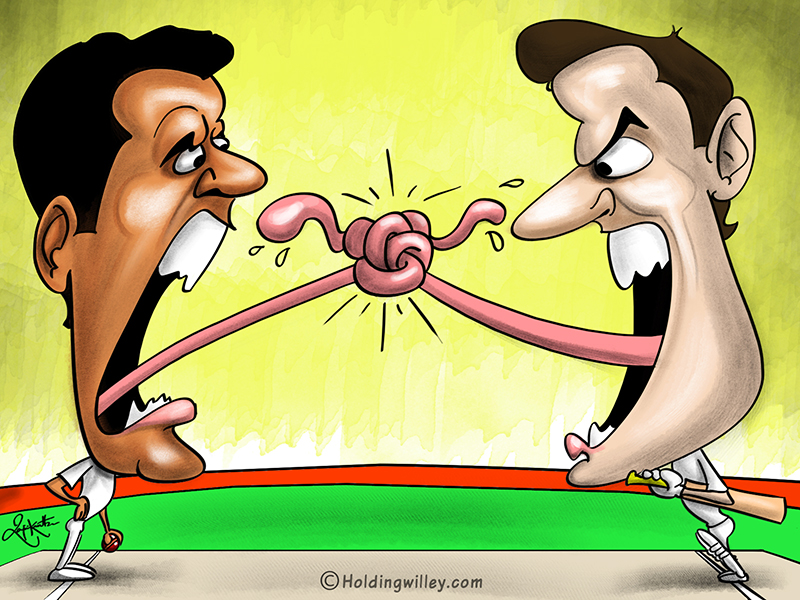 The ongoing Australian tour of South Africa is in very real danger of being remembered for the wrong reasons. Instead of looking back on what has been an enthralling match-up between two good cricket teams, evenly matched in conditions that allow a contest between bat and ball to thrive, all everyone’s talking about is cricketers behaving badly.
The ongoing Australian tour of South Africa is in very real danger of being remembered for the wrong reasons. Instead of looking back on what has been an enthralling match-up between two good cricket teams, evenly matched in conditions that allow a contest between bat and ball to thrive, all everyone’s talking about is cricketers behaving badly.
The series of unsavoury incidents range from wild send-offs and dropping balls near fallen opponents, to a barely prevented off-field brawl and physical contact between the world’s best fast bowler and Test batsman.
Instead of everyone enjoying the battle between the world’s two best fast bowling units, we are busy guessing who will cross the so called ‘line’ next.
It’s no coincidence the Australians always seem to be involved when the topic of sledging, gamesmanship or ‘mental disintegration’ is discussed. However, Faf du Plessis and the South Africans are no shrinking violets either and are more than happy to give as good as they get, while challenging the ICC’s match referees at every opportunity.
Make no mistake, sledging and targeted verbal abuse are a blight on our great game. As Ian Chappell has said many times, sledging and banter has always been around, but it was always spur of the moment, and usually witty – a throwaway line to distract an opponent. These days, teams use it as a tactic. Players are targeted constantly with vile words and verbal diarrhoea, so it’s no wonder they snap and respond like Quinton de Kock did in Durban.
If the rumours of what he said are true, his words are indefensible. At the same time David Warner is no angel. He and the Australian team might not feel that he crossed their imaginary line of what is acceptable and what is not, but he clearly crossed de Kock’s line and wasn’t pleased with the consequences.
When you take it upon yourself to be your team’s ‘Bull’ and verbal enforcer, when pre-series your team says they will try and bait the opposition’s strike bowler in a bid to get him suspended, you have to be prepared for any responses and reactions that come your way.
It’s almost a trademark of pre-series and pre-match press conferences involving Australian players to centre on questions and discussions of trying to get into opponents’ heads, targeting certain players, “letting them know.” But of course, never crossing the ‘line’. Before the Ashes it was the usually reserved Nathan Lyon saying he wanted to end English careers, and the same man who dropped the ball in the face of a prone AB de Villiers at Kingsmead.
The behaviour in this series has also contributed to the debate around the use of stump microphones and whether they should be turned up or down, whether the public and in particular impressionable children need to hear what is being said on the field. Personally, I have no issue with the stump microphones – if a player is worried what they say will be heard around the world then they probably shouldn’t be saying it in the first place.
Test cricket is already an intense battle of body and mind, of two teams going at each other over the course of five high pressure days. There is no need for planned verbal assaults - the game has enough drama.
With all that being said, we don’t want our favourite cricketers to be robots either. There is room in the arena for the passion and fire of players like Kagiso Rabada, Mitchell Starc and Virat Kohli.
As du Plessis said, when someone like Rabada toils away over after over to dismiss a batsman, it is inevitable his emotions will come to the fore, like a pressure valve being released upon the achievement of taking a wicket. I’m all for big, loud, passionate celebrations. The game of cricket would be poorer if we had never seen Brett Lee’s chainsaw or Freddie Flintoff’s roar with arms raised to soak in the adulation of adoring teammates and fans.
These wicket celebrations were full of passion, intensity and emotion. A fast bowler’s release. But most importantly, they were not obnoxious send-offs in the face of the departing batsman. To give a batsman whose wicket you’ve taken a verbal barrage, or clip of the shoulder in Rabada’s case, are completely unnecessary no matter how tempting it may be.
Sure, in the case of dismissing someone like a Warner, who may have been at you all day, it would be hard to resist telling him where to go. But the battle has already been won by the bowler. Nothing more need be said.
Test cricket is played by red blooded males in a high-pressure environment, but they are all grown men, so it’s about time they started acting like it. We don’t want to see the best players missing games due to suspension, all because they felt the need to abuse, taunt or threaten an opponent. Of course there will be talk on the field; banter, witty retorts, and remarks to throw an opponent off their game. But these are best when they are in the moment, not planned verbal attacks aimed at drawing an emotional and at times hostile reaction.
Play the game with aggression and fire, passion and intensity, but channel it in the right direction. Otherwise, the recent incidents of misbehaviour won’t be the worst things we see happen on the field.
Fast. Lite. Innovative. Shareable. Download our HW Cricket App, for Android and iOS!